Management Accounting: Principles, Integration, Tools & Techniques
VerifiedAdded on 2023/06/08
|15
|4769
|244
Report
AI Summary
This report provides a comprehensive overview of management accounting, covering its principles, roles, and techniques. It begins by outlining key management accounting principles such as data presentation, accuracy, stability, punctuality, exception handling, efficiency measurement, and resource utilization. The report then discusses the roles of management accounting, including data provision, data modification, communication facilitation, control, qualitative information provision, policy formulation, and coordination. It further explores the use of techniques like marginal costing and absorption costing, presenting calculations for an income statement using variable costing. The integration of management accounting within an organization is also examined, highlighting its importance in decision-making and strategic analysis. The report concludes with a comparison of management accounting tools and recommendations for sustainable commercial enterprise.
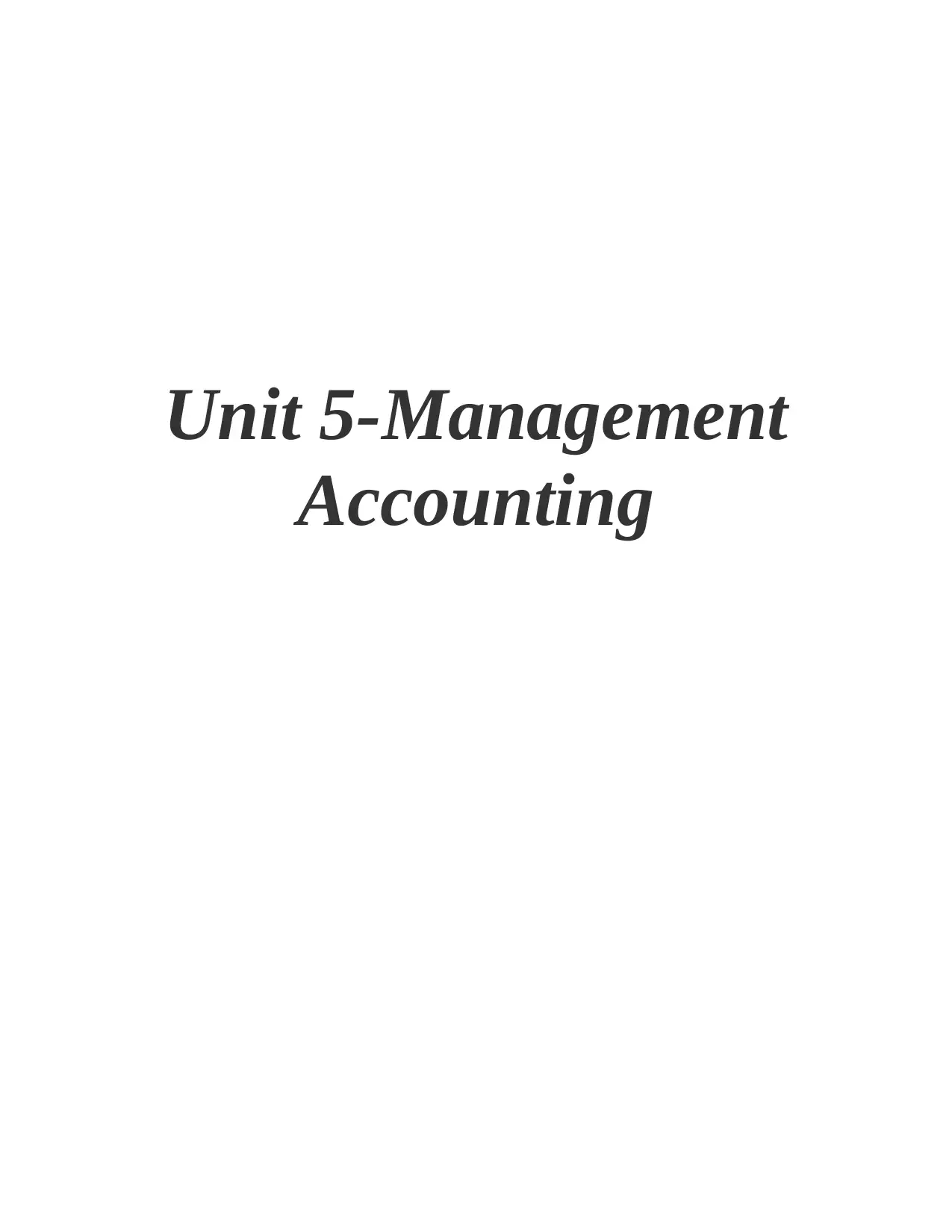
Unit 5-Management
Accounting
Accounting
Paraphrase This Document
Need a fresh take? Get an instant paraphrase of this document with our AI Paraphraser
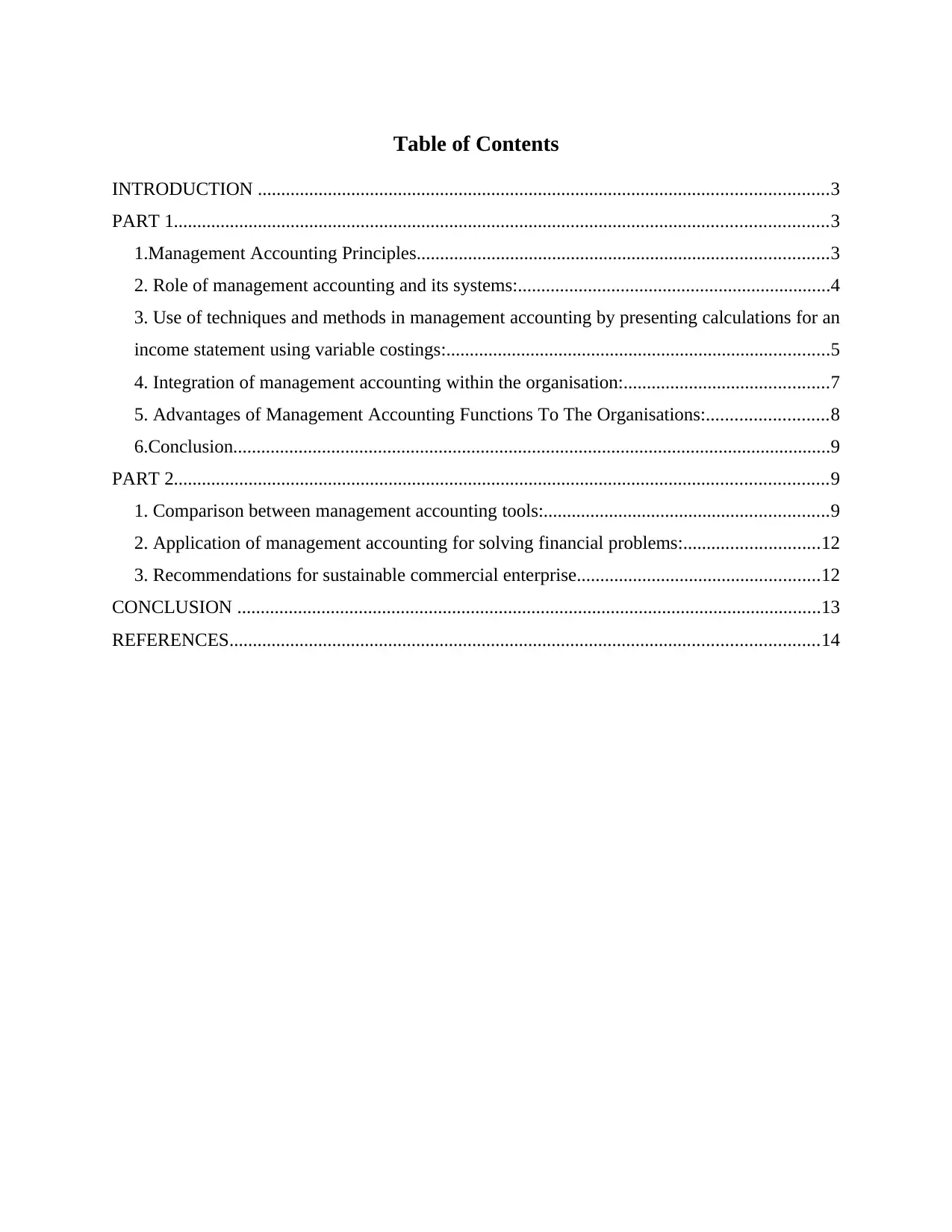
Table of Contents
INTRODUCTION ..........................................................................................................................3
PART 1............................................................................................................................................3
1.Management Accounting Principles........................................................................................3
2. Role of management accounting and its systems:...................................................................4
3. Use of techniques and methods in management accounting by presenting calculations for an
income statement using variable costings:..................................................................................5
4. Integration of management accounting within the organisation:............................................7
5. Advantages of Management Accounting Functions To The Organisations:..........................8
6.Conclusion................................................................................................................................9
PART 2............................................................................................................................................9
1. Comparison between management accounting tools:.............................................................9
2. Application of management accounting for solving financial problems:.............................12
3. Recommendations for sustainable commercial enterprise....................................................12
CONCLUSION .............................................................................................................................13
REFERENCES..............................................................................................................................14
INTRODUCTION ..........................................................................................................................3
PART 1............................................................................................................................................3
1.Management Accounting Principles........................................................................................3
2. Role of management accounting and its systems:...................................................................4
3. Use of techniques and methods in management accounting by presenting calculations for an
income statement using variable costings:..................................................................................5
4. Integration of management accounting within the organisation:............................................7
5. Advantages of Management Accounting Functions To The Organisations:..........................8
6.Conclusion................................................................................................................................9
PART 2............................................................................................................................................9
1. Comparison between management accounting tools:.............................................................9
2. Application of management accounting for solving financial problems:.............................12
3. Recommendations for sustainable commercial enterprise....................................................12
CONCLUSION .............................................................................................................................13
REFERENCES..............................................................................................................................14
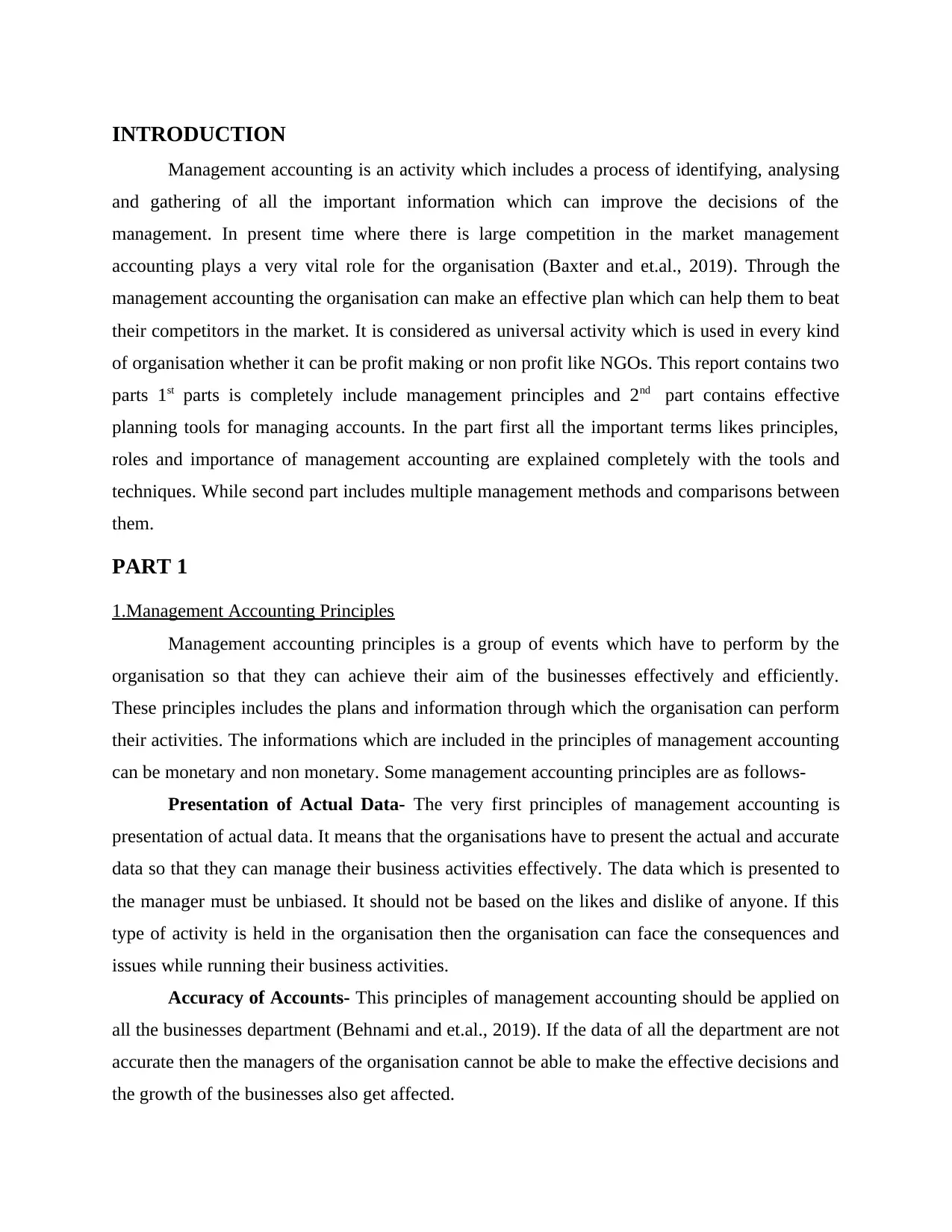
INTRODUCTION
Management accounting is an activity which includes a process of identifying, analysing
and gathering of all the important information which can improve the decisions of the
management. In present time where there is large competition in the market management
accounting plays a very vital role for the organisation (Baxter and et.al., 2019). Through the
management accounting the organisation can make an effective plan which can help them to beat
their competitors in the market. It is considered as universal activity which is used in every kind
of organisation whether it can be profit making or non profit like NGOs. This report contains two
parts 1st parts is completely include management principles and 2nd part contains effective
planning tools for managing accounts. In the part first all the important terms likes principles,
roles and importance of management accounting are explained completely with the tools and
techniques. While second part includes multiple management methods and comparisons between
them.
PART 1
1.Management Accounting Principles
Management accounting principles is a group of events which have to perform by the
organisation so that they can achieve their aim of the businesses effectively and efficiently.
These principles includes the plans and information through which the organisation can perform
their activities. The informations which are included in the principles of management accounting
can be monetary and non monetary. Some management accounting principles are as follows-
Presentation of Actual Data- The very first principles of management accounting is
presentation of actual data. It means that the organisations have to present the actual and accurate
data so that they can manage their business activities effectively. The data which is presented to
the manager must be unbiased. It should not be based on the likes and dislike of anyone. If this
type of activity is held in the organisation then the organisation can face the consequences and
issues while running their business activities.
Accuracy of Accounts- This principles of management accounting should be applied on
all the businesses department (Behnami and et.al., 2019). If the data of all the department are not
accurate then the managers of the organisation cannot be able to make the effective decisions and
the growth of the businesses also get affected.
Management accounting is an activity which includes a process of identifying, analysing
and gathering of all the important information which can improve the decisions of the
management. In present time where there is large competition in the market management
accounting plays a very vital role for the organisation (Baxter and et.al., 2019). Through the
management accounting the organisation can make an effective plan which can help them to beat
their competitors in the market. It is considered as universal activity which is used in every kind
of organisation whether it can be profit making or non profit like NGOs. This report contains two
parts 1st parts is completely include management principles and 2nd part contains effective
planning tools for managing accounts. In the part first all the important terms likes principles,
roles and importance of management accounting are explained completely with the tools and
techniques. While second part includes multiple management methods and comparisons between
them.
PART 1
1.Management Accounting Principles
Management accounting principles is a group of events which have to perform by the
organisation so that they can achieve their aim of the businesses effectively and efficiently.
These principles includes the plans and information through which the organisation can perform
their activities. The informations which are included in the principles of management accounting
can be monetary and non monetary. Some management accounting principles are as follows-
Presentation of Actual Data- The very first principles of management accounting is
presentation of actual data. It means that the organisations have to present the actual and accurate
data so that they can manage their business activities effectively. The data which is presented to
the manager must be unbiased. It should not be based on the likes and dislike of anyone. If this
type of activity is held in the organisation then the organisation can face the consequences and
issues while running their business activities.
Accuracy of Accounts- This principles of management accounting should be applied on
all the businesses department (Behnami and et.al., 2019). If the data of all the department are not
accurate then the managers of the organisation cannot be able to make the effective decisions and
the growth of the businesses also get affected.
⊘ This is a preview!⊘
Do you want full access?
Subscribe today to unlock all pages.

Trusted by 1+ million students worldwide
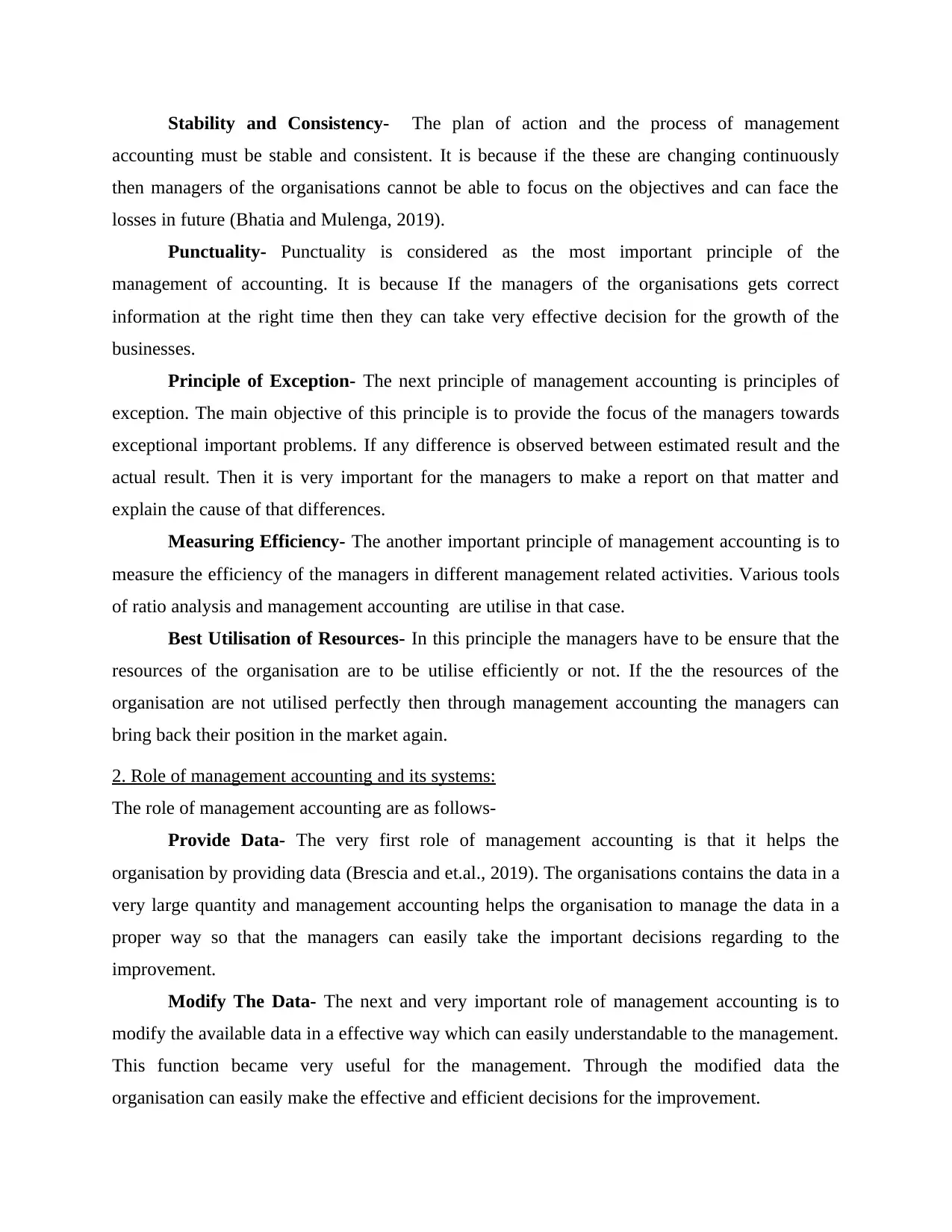
Stability and Consistency- The plan of action and the process of management
accounting must be stable and consistent. It is because if the these are changing continuously
then managers of the organisations cannot be able to focus on the objectives and can face the
losses in future (Bhatia and Mulenga, 2019).
Punctuality- Punctuality is considered as the most important principle of the
management of accounting. It is because If the managers of the organisations gets correct
information at the right time then they can take very effective decision for the growth of the
businesses.
Principle of Exception- The next principle of management accounting is principles of
exception. The main objective of this principle is to provide the focus of the managers towards
exceptional important problems. If any difference is observed between estimated result and the
actual result. Then it is very important for the managers to make a report on that matter and
explain the cause of that differences.
Measuring Efficiency- The another important principle of management accounting is to
measure the efficiency of the managers in different management related activities. Various tools
of ratio analysis and management accounting are utilise in that case.
Best Utilisation of Resources- In this principle the managers have to be ensure that the
resources of the organisation are to be utilise efficiently or not. If the the resources of the
organisation are not utilised perfectly then through management accounting the managers can
bring back their position in the market again.
2. Role of management accounting and its systems:
The role of management accounting are as follows-
Provide Data- The very first role of management accounting is that it helps the
organisation by providing data (Brescia and et.al., 2019). The organisations contains the data in a
very large quantity and management accounting helps the organisation to manage the data in a
proper way so that the managers can easily take the important decisions regarding to the
improvement.
Modify The Data- The next and very important role of management accounting is to
modify the available data in a effective way which can easily understandable to the management.
This function became very useful for the management. Through the modified data the
organisation can easily make the effective and efficient decisions for the improvement.
accounting must be stable and consistent. It is because if the these are changing continuously
then managers of the organisations cannot be able to focus on the objectives and can face the
losses in future (Bhatia and Mulenga, 2019).
Punctuality- Punctuality is considered as the most important principle of the
management of accounting. It is because If the managers of the organisations gets correct
information at the right time then they can take very effective decision for the growth of the
businesses.
Principle of Exception- The next principle of management accounting is principles of
exception. The main objective of this principle is to provide the focus of the managers towards
exceptional important problems. If any difference is observed between estimated result and the
actual result. Then it is very important for the managers to make a report on that matter and
explain the cause of that differences.
Measuring Efficiency- The another important principle of management accounting is to
measure the efficiency of the managers in different management related activities. Various tools
of ratio analysis and management accounting are utilise in that case.
Best Utilisation of Resources- In this principle the managers have to be ensure that the
resources of the organisation are to be utilise efficiently or not. If the the resources of the
organisation are not utilised perfectly then through management accounting the managers can
bring back their position in the market again.
2. Role of management accounting and its systems:
The role of management accounting are as follows-
Provide Data- The very first role of management accounting is that it helps the
organisation by providing data (Brescia and et.al., 2019). The organisations contains the data in a
very large quantity and management accounting helps the organisation to manage the data in a
proper way so that the managers can easily take the important decisions regarding to the
improvement.
Modify The Data- The next and very important role of management accounting is to
modify the available data in a effective way which can easily understandable to the management.
This function became very useful for the management. Through the modified data the
organisation can easily make the effective and efficient decisions for the improvement.
Paraphrase This Document
Need a fresh take? Get an instant paraphrase of this document with our AI Paraphraser
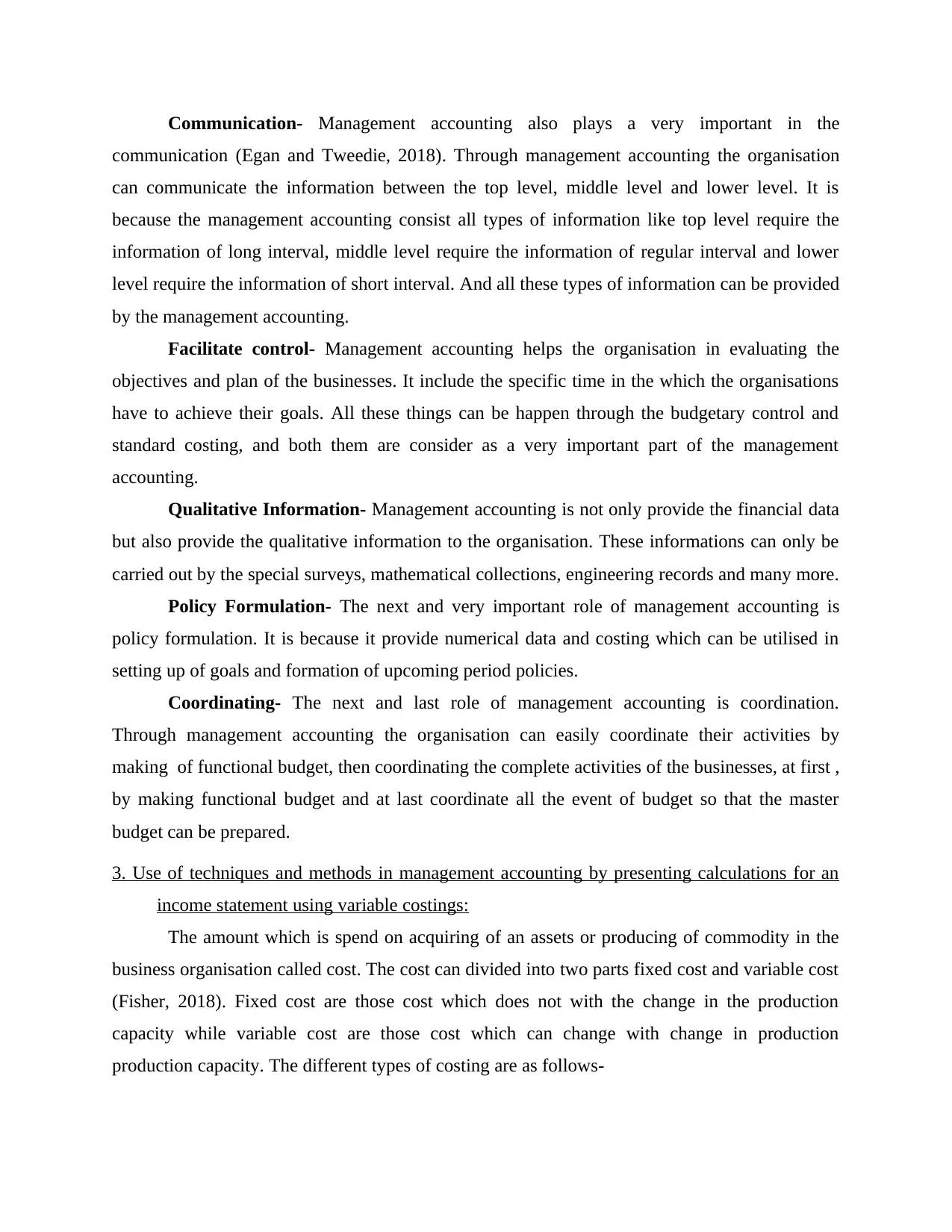
Communication- Management accounting also plays a very important in the
communication (Egan and Tweedie, 2018). Through management accounting the organisation
can communicate the information between the top level, middle level and lower level. It is
because the management accounting consist all types of information like top level require the
information of long interval, middle level require the information of regular interval and lower
level require the information of short interval. And all these types of information can be provided
by the management accounting.
Facilitate control- Management accounting helps the organisation in evaluating the
objectives and plan of the businesses. It include the specific time in the which the organisations
have to achieve their goals. All these things can be happen through the budgetary control and
standard costing, and both them are consider as a very important part of the management
accounting.
Qualitative Information- Management accounting is not only provide the financial data
but also provide the qualitative information to the organisation. These informations can only be
carried out by the special surveys, mathematical collections, engineering records and many more.
Policy Formulation- The next and very important role of management accounting is
policy formulation. It is because it provide numerical data and costing which can be utilised in
setting up of goals and formation of upcoming period policies.
Coordinating- The next and last role of management accounting is coordination.
Through management accounting the organisation can easily coordinate their activities by
making of functional budget, then coordinating the complete activities of the businesses, at first ,
by making functional budget and at last coordinate all the event of budget so that the master
budget can be prepared.
3. Use of techniques and methods in management accounting by presenting calculations for an
income statement using variable costings:
The amount which is spend on acquiring of an assets or producing of commodity in the
business organisation called cost. The cost can divided into two parts fixed cost and variable cost
(Fisher, 2018). Fixed cost are those cost which does not with the change in the production
capacity while variable cost are those cost which can change with change in production
production capacity. The different types of costing are as follows-
communication (Egan and Tweedie, 2018). Through management accounting the organisation
can communicate the information between the top level, middle level and lower level. It is
because the management accounting consist all types of information like top level require the
information of long interval, middle level require the information of regular interval and lower
level require the information of short interval. And all these types of information can be provided
by the management accounting.
Facilitate control- Management accounting helps the organisation in evaluating the
objectives and plan of the businesses. It include the specific time in the which the organisations
have to achieve their goals. All these things can be happen through the budgetary control and
standard costing, and both them are consider as a very important part of the management
accounting.
Qualitative Information- Management accounting is not only provide the financial data
but also provide the qualitative information to the organisation. These informations can only be
carried out by the special surveys, mathematical collections, engineering records and many more.
Policy Formulation- The next and very important role of management accounting is
policy formulation. It is because it provide numerical data and costing which can be utilised in
setting up of goals and formation of upcoming period policies.
Coordinating- The next and last role of management accounting is coordination.
Through management accounting the organisation can easily coordinate their activities by
making of functional budget, then coordinating the complete activities of the businesses, at first ,
by making functional budget and at last coordinate all the event of budget so that the master
budget can be prepared.
3. Use of techniques and methods in management accounting by presenting calculations for an
income statement using variable costings:
The amount which is spend on acquiring of an assets or producing of commodity in the
business organisation called cost. The cost can divided into two parts fixed cost and variable cost
(Fisher, 2018). Fixed cost are those cost which does not with the change in the production
capacity while variable cost are those cost which can change with change in production
production capacity. The different types of costing are as follows-
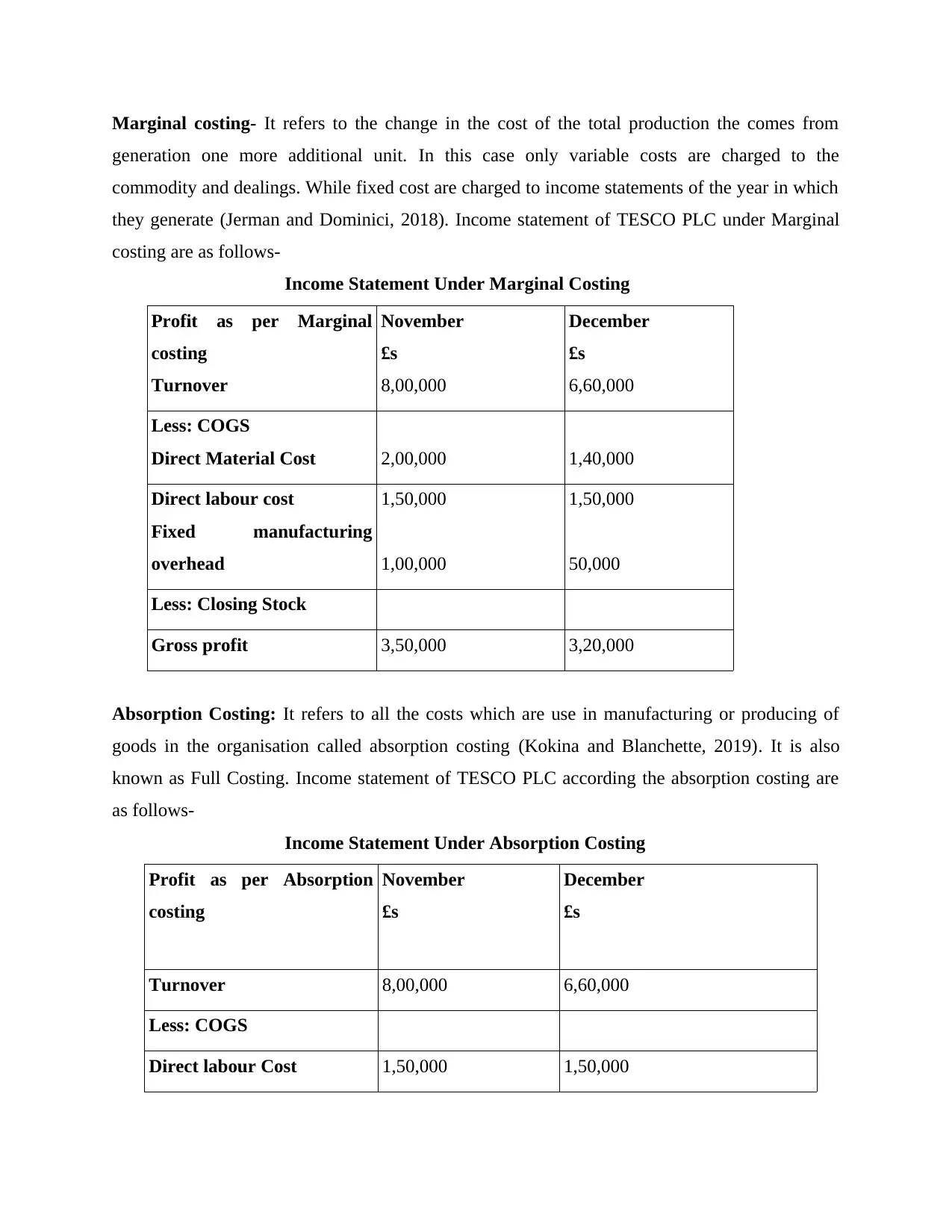
Marginal costing- It refers to the change in the cost of the total production the comes from
generation one more additional unit. In this case only variable costs are charged to the
commodity and dealings. While fixed cost are charged to income statements of the year in which
they generate (Jerman and Dominici, 2018). Income statement of TESCO PLC under Marginal
costing are as follows-
Income Statement Under Marginal Costing
Profit as per Marginal
costing
Turnover
November
£s
8,00,000
December
£s
6,60,000
Less: COGS
Direct Material Cost 2,00,000 1,40,000
Direct labour cost
Fixed manufacturing
overhead
1,50,000
1,00,000
1,50,000
50,000
Less: Closing Stock
Gross profit 3,50,000 3,20,000
Absorption Costing: It refers to all the costs which are use in manufacturing or producing of
goods in the organisation called absorption costing (Kokina and Blanchette, 2019). It is also
known as Full Costing. Income statement of TESCO PLC according the absorption costing are
as follows-
Income Statement Under Absorption Costing
Profit as per Absorption
costing
November
£s
December
£s
Turnover 8,00,000 6,60,000
Less: COGS
Direct labour Cost 1,50,000 1,50,000
generation one more additional unit. In this case only variable costs are charged to the
commodity and dealings. While fixed cost are charged to income statements of the year in which
they generate (Jerman and Dominici, 2018). Income statement of TESCO PLC under Marginal
costing are as follows-
Income Statement Under Marginal Costing
Profit as per Marginal
costing
Turnover
November
£s
8,00,000
December
£s
6,60,000
Less: COGS
Direct Material Cost 2,00,000 1,40,000
Direct labour cost
Fixed manufacturing
overhead
1,50,000
1,00,000
1,50,000
50,000
Less: Closing Stock
Gross profit 3,50,000 3,20,000
Absorption Costing: It refers to all the costs which are use in manufacturing or producing of
goods in the organisation called absorption costing (Kokina and Blanchette, 2019). It is also
known as Full Costing. Income statement of TESCO PLC according the absorption costing are
as follows-
Income Statement Under Absorption Costing
Profit as per Absorption
costing
November
£s
December
£s
Turnover 8,00,000 6,60,000
Less: COGS
Direct labour Cost 1,50,000 1,50,000
⊘ This is a preview!⊘
Do you want full access?
Subscribe today to unlock all pages.

Trusted by 1+ million students worldwide
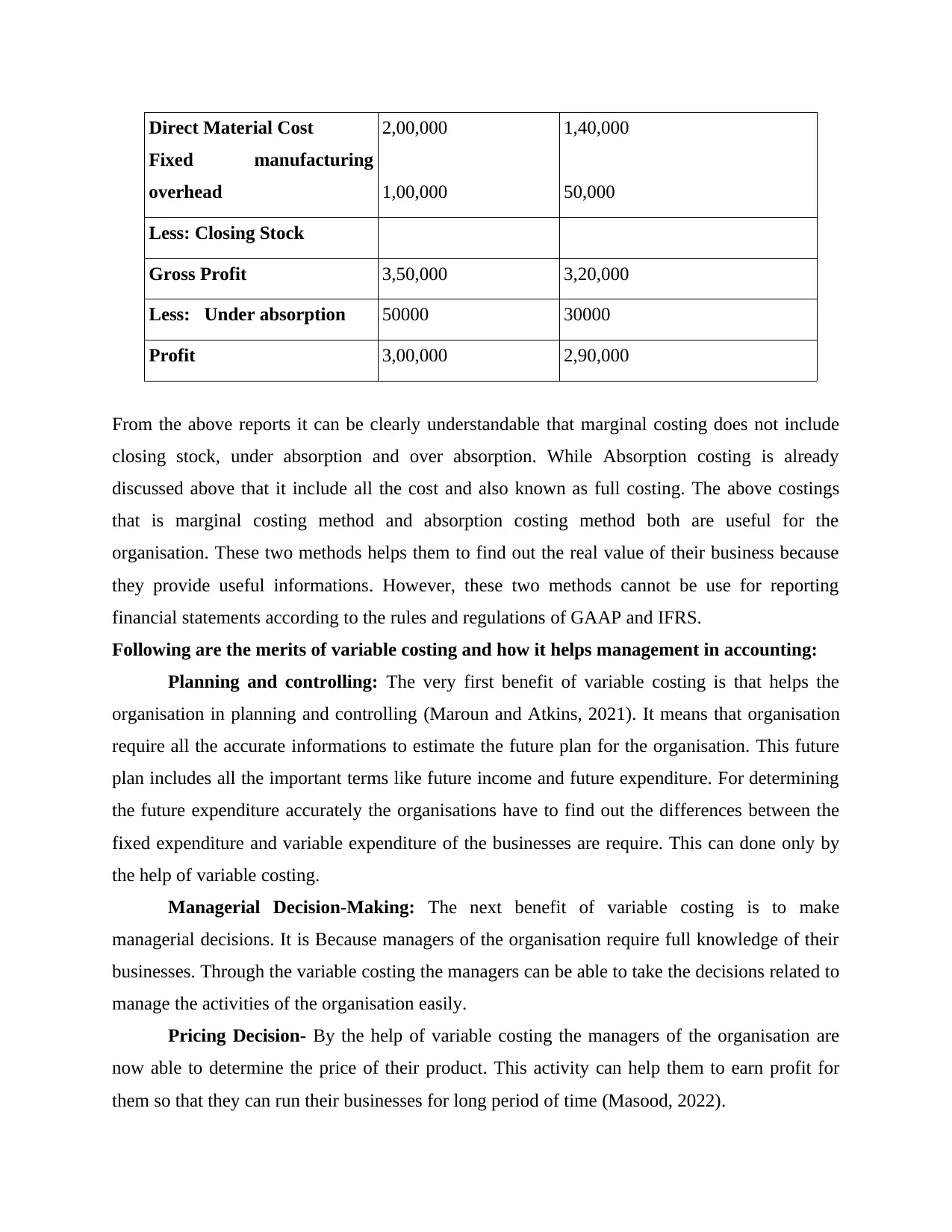
Direct Material Cost
Fixed manufacturing
overhead
2,00,000
1,00,000
1,40,000
50,000
Less: Closing Stock
Gross Profit 3,50,000 3,20,000
Less: Under absorption 50000 30000
Profit 3,00,000 2,90,000
From the above reports it can be clearly understandable that marginal costing does not include
closing stock, under absorption and over absorption. While Absorption costing is already
discussed above that it include all the cost and also known as full costing. The above costings
that is marginal costing method and absorption costing method both are useful for the
organisation. These two methods helps them to find out the real value of their business because
they provide useful informations. However, these two methods cannot be use for reporting
financial statements according to the rules and regulations of GAAP and IFRS.
Following are the merits of variable costing and how it helps management in accounting:
Planning and controlling: The very first benefit of variable costing is that helps the
organisation in planning and controlling (Maroun and Atkins, 2021). It means that organisation
require all the accurate informations to estimate the future plan for the organisation. This future
plan includes all the important terms like future income and future expenditure. For determining
the future expenditure accurately the organisations have to find out the differences between the
fixed expenditure and variable expenditure of the businesses are require. This can done only by
the help of variable costing.
Managerial Decision-Making: The next benefit of variable costing is to make
managerial decisions. It is Because managers of the organisation require full knowledge of their
businesses. Through the variable costing the managers can be able to take the decisions related to
manage the activities of the organisation easily.
Pricing Decision- By the help of variable costing the managers of the organisation are
now able to determine the price of their product. This activity can help them to earn profit for
them so that they can run their businesses for long period of time (Masood, 2022).
Fixed manufacturing
overhead
2,00,000
1,00,000
1,40,000
50,000
Less: Closing Stock
Gross Profit 3,50,000 3,20,000
Less: Under absorption 50000 30000
Profit 3,00,000 2,90,000
From the above reports it can be clearly understandable that marginal costing does not include
closing stock, under absorption and over absorption. While Absorption costing is already
discussed above that it include all the cost and also known as full costing. The above costings
that is marginal costing method and absorption costing method both are useful for the
organisation. These two methods helps them to find out the real value of their business because
they provide useful informations. However, these two methods cannot be use for reporting
financial statements according to the rules and regulations of GAAP and IFRS.
Following are the merits of variable costing and how it helps management in accounting:
Planning and controlling: The very first benefit of variable costing is that helps the
organisation in planning and controlling (Maroun and Atkins, 2021). It means that organisation
require all the accurate informations to estimate the future plan for the organisation. This future
plan includes all the important terms like future income and future expenditure. For determining
the future expenditure accurately the organisations have to find out the differences between the
fixed expenditure and variable expenditure of the businesses are require. This can done only by
the help of variable costing.
Managerial Decision-Making: The next benefit of variable costing is to make
managerial decisions. It is Because managers of the organisation require full knowledge of their
businesses. Through the variable costing the managers can be able to take the decisions related to
manage the activities of the organisation easily.
Pricing Decision- By the help of variable costing the managers of the organisation are
now able to determine the price of their product. This activity can help them to earn profit for
them so that they can run their businesses for long period of time (Masood, 2022).
Paraphrase This Document
Need a fresh take? Get an instant paraphrase of this document with our AI Paraphraser
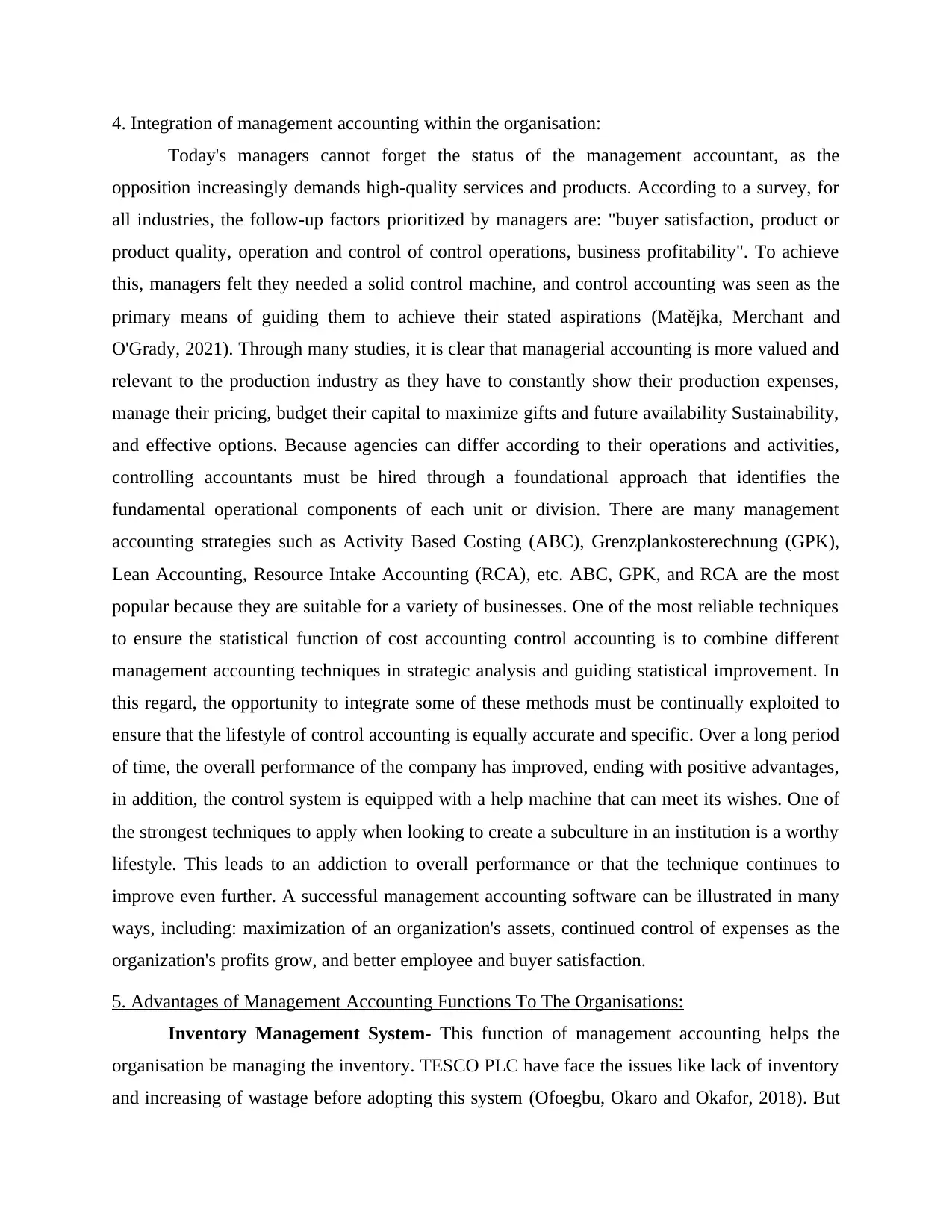
4. Integration of management accounting within the organisation:
Today's managers cannot forget the status of the management accountant, as the
opposition increasingly demands high-quality services and products. According to a survey, for
all industries, the follow-up factors prioritized by managers are: "buyer satisfaction, product or
product quality, operation and control of control operations, business profitability". To achieve
this, managers felt they needed a solid control machine, and control accounting was seen as the
primary means of guiding them to achieve their stated aspirations (Matějka, Merchant and
O'Grady, 2021). Through many studies, it is clear that managerial accounting is more valued and
relevant to the production industry as they have to constantly show their production expenses,
manage their pricing, budget their capital to maximize gifts and future availability Sustainability,
and effective options. Because agencies can differ according to their operations and activities,
controlling accountants must be hired through a foundational approach that identifies the
fundamental operational components of each unit or division. There are many management
accounting strategies such as Activity Based Costing (ABC), Grenzplankosterechnung (GPK),
Lean Accounting, Resource Intake Accounting (RCA), etc. ABC, GPK, and RCA are the most
popular because they are suitable for a variety of businesses. One of the most reliable techniques
to ensure the statistical function of cost accounting control accounting is to combine different
management accounting techniques in strategic analysis and guiding statistical improvement. In
this regard, the opportunity to integrate some of these methods must be continually exploited to
ensure that the lifestyle of control accounting is equally accurate and specific. Over a long period
of time, the overall performance of the company has improved, ending with positive advantages,
in addition, the control system is equipped with a help machine that can meet its wishes. One of
the strongest techniques to apply when looking to create a subculture in an institution is a worthy
lifestyle. This leads to an addiction to overall performance or that the technique continues to
improve even further. A successful management accounting software can be illustrated in many
ways, including: maximization of an organization's assets, continued control of expenses as the
organization's profits grow, and better employee and buyer satisfaction.
5. Advantages of Management Accounting Functions To The Organisations:
Inventory Management System- This function of management accounting helps the
organisation be managing the inventory. TESCO PLC have face the issues like lack of inventory
and increasing of wastage before adopting this system (Ofoegbu, Okaro and Okafor, 2018). But
Today's managers cannot forget the status of the management accountant, as the
opposition increasingly demands high-quality services and products. According to a survey, for
all industries, the follow-up factors prioritized by managers are: "buyer satisfaction, product or
product quality, operation and control of control operations, business profitability". To achieve
this, managers felt they needed a solid control machine, and control accounting was seen as the
primary means of guiding them to achieve their stated aspirations (Matějka, Merchant and
O'Grady, 2021). Through many studies, it is clear that managerial accounting is more valued and
relevant to the production industry as they have to constantly show their production expenses,
manage their pricing, budget their capital to maximize gifts and future availability Sustainability,
and effective options. Because agencies can differ according to their operations and activities,
controlling accountants must be hired through a foundational approach that identifies the
fundamental operational components of each unit or division. There are many management
accounting strategies such as Activity Based Costing (ABC), Grenzplankosterechnung (GPK),
Lean Accounting, Resource Intake Accounting (RCA), etc. ABC, GPK, and RCA are the most
popular because they are suitable for a variety of businesses. One of the most reliable techniques
to ensure the statistical function of cost accounting control accounting is to combine different
management accounting techniques in strategic analysis and guiding statistical improvement. In
this regard, the opportunity to integrate some of these methods must be continually exploited to
ensure that the lifestyle of control accounting is equally accurate and specific. Over a long period
of time, the overall performance of the company has improved, ending with positive advantages,
in addition, the control system is equipped with a help machine that can meet its wishes. One of
the strongest techniques to apply when looking to create a subculture in an institution is a worthy
lifestyle. This leads to an addiction to overall performance or that the technique continues to
improve even further. A successful management accounting software can be illustrated in many
ways, including: maximization of an organization's assets, continued control of expenses as the
organization's profits grow, and better employee and buyer satisfaction.
5. Advantages of Management Accounting Functions To The Organisations:
Inventory Management System- This function of management accounting helps the
organisation be managing the inventory. TESCO PLC have face the issues like lack of inventory
and increasing of wastage before adopting this system (Ofoegbu, Okaro and Okafor, 2018). But
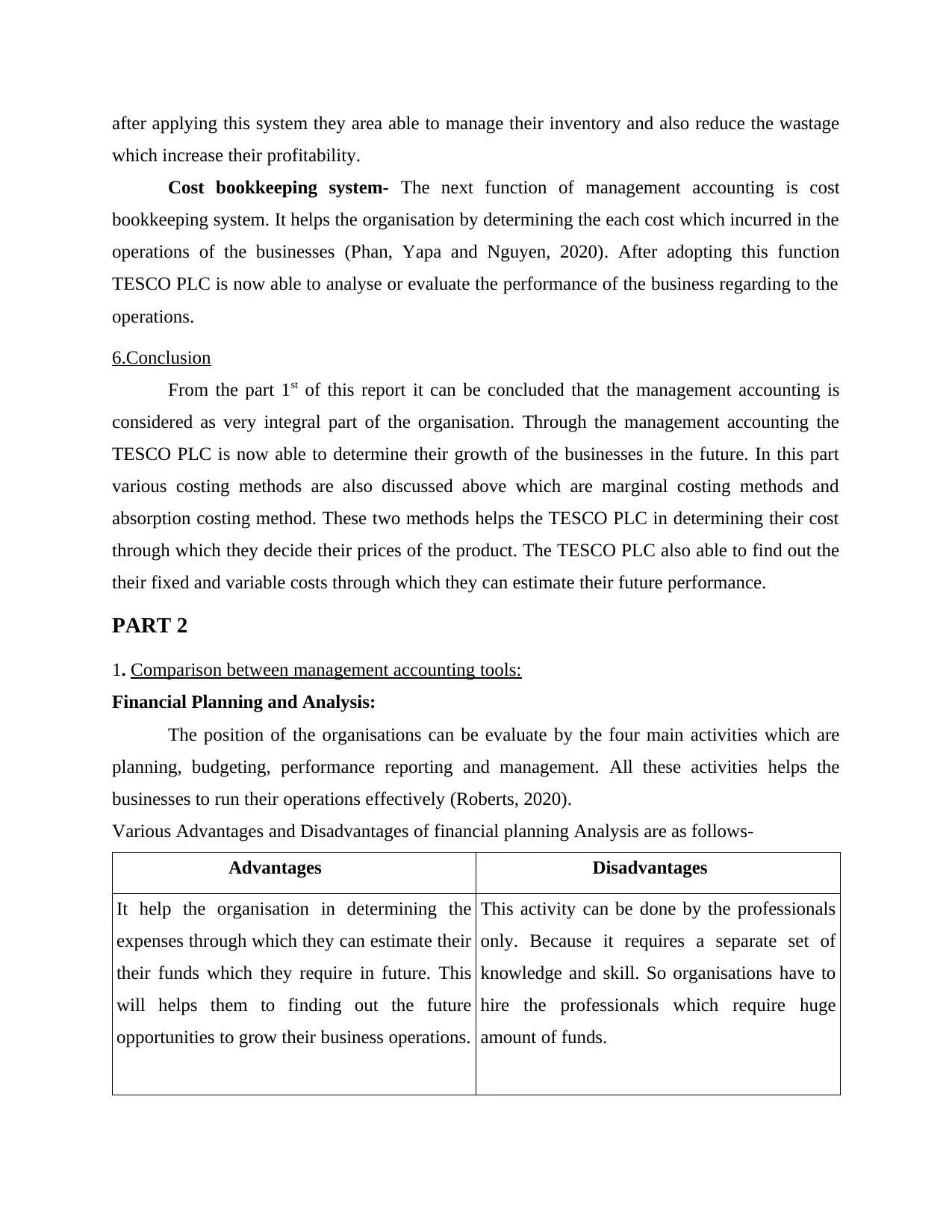
after applying this system they area able to manage their inventory and also reduce the wastage
which increase their profitability.
Cost bookkeeping system- The next function of management accounting is cost
bookkeeping system. It helps the organisation by determining the each cost which incurred in the
operations of the businesses (Phan, Yapa and Nguyen, 2020). After adopting this function
TESCO PLC is now able to analyse or evaluate the performance of the business regarding to the
operations.
6.Conclusion
From the part 1st of this report it can be concluded that the management accounting is
considered as very integral part of the organisation. Through the management accounting the
TESCO PLC is now able to determine their growth of the businesses in the future. In this part
various costing methods are also discussed above which are marginal costing methods and
absorption costing method. These two methods helps the TESCO PLC in determining their cost
through which they decide their prices of the product. The TESCO PLC also able to find out the
their fixed and variable costs through which they can estimate their future performance.
PART 2
1. Comparison between management accounting tools:
Financial Planning and Analysis:
The position of the organisations can be evaluate by the four main activities which are
planning, budgeting, performance reporting and management. All these activities helps the
businesses to run their operations effectively (Roberts, 2020).
Various Advantages and Disadvantages of financial planning Analysis are as follows-
Advantages Disadvantages
It help the organisation in determining the
expenses through which they can estimate their
their funds which they require in future. This
will helps them to finding out the future
opportunities to grow their business operations.
This activity can be done by the professionals
only. Because it requires a separate set of
knowledge and skill. So organisations have to
hire the professionals which require huge
amount of funds.
which increase their profitability.
Cost bookkeeping system- The next function of management accounting is cost
bookkeeping system. It helps the organisation by determining the each cost which incurred in the
operations of the businesses (Phan, Yapa and Nguyen, 2020). After adopting this function
TESCO PLC is now able to analyse or evaluate the performance of the business regarding to the
operations.
6.Conclusion
From the part 1st of this report it can be concluded that the management accounting is
considered as very integral part of the organisation. Through the management accounting the
TESCO PLC is now able to determine their growth of the businesses in the future. In this part
various costing methods are also discussed above which are marginal costing methods and
absorption costing method. These two methods helps the TESCO PLC in determining their cost
through which they decide their prices of the product. The TESCO PLC also able to find out the
their fixed and variable costs through which they can estimate their future performance.
PART 2
1. Comparison between management accounting tools:
Financial Planning and Analysis:
The position of the organisations can be evaluate by the four main activities which are
planning, budgeting, performance reporting and management. All these activities helps the
businesses to run their operations effectively (Roberts, 2020).
Various Advantages and Disadvantages of financial planning Analysis are as follows-
Advantages Disadvantages
It help the organisation in determining the
expenses through which they can estimate their
their funds which they require in future. This
will helps them to finding out the future
opportunities to grow their business operations.
This activity can be done by the professionals
only. Because it requires a separate set of
knowledge and skill. So organisations have to
hire the professionals which require huge
amount of funds.
⊘ This is a preview!⊘
Do you want full access?
Subscribe today to unlock all pages.

Trusted by 1+ million students worldwide
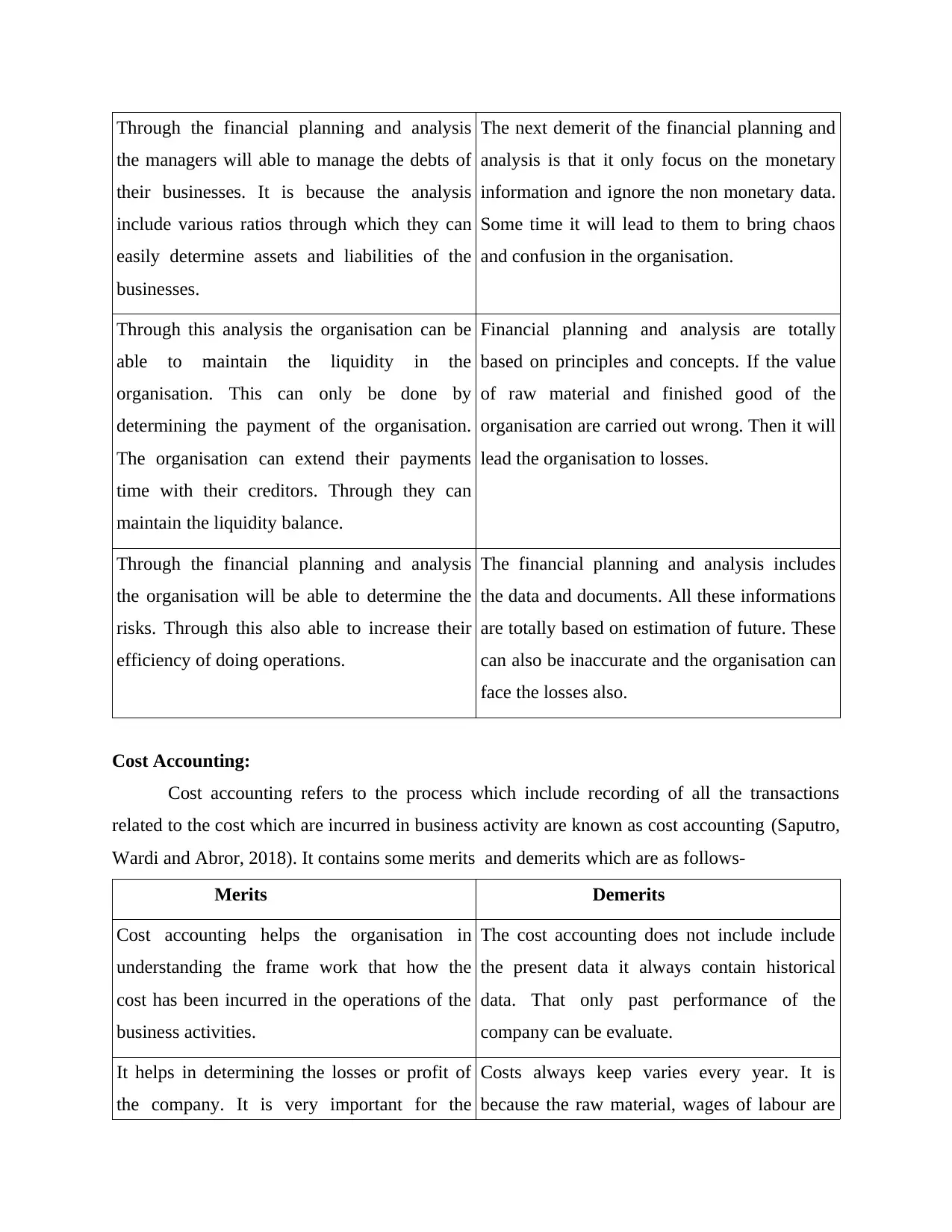
Through the financial planning and analysis
the managers will able to manage the debts of
their businesses. It is because the analysis
include various ratios through which they can
easily determine assets and liabilities of the
businesses.
The next demerit of the financial planning and
analysis is that it only focus on the monetary
information and ignore the non monetary data.
Some time it will lead to them to bring chaos
and confusion in the organisation.
Through this analysis the organisation can be
able to maintain the liquidity in the
organisation. This can only be done by
determining the payment of the organisation.
The organisation can extend their payments
time with their creditors. Through they can
maintain the liquidity balance.
Financial planning and analysis are totally
based on principles and concepts. If the value
of raw material and finished good of the
organisation are carried out wrong. Then it will
lead the organisation to losses.
Through the financial planning and analysis
the organisation will be able to determine the
risks. Through this also able to increase their
efficiency of doing operations.
The financial planning and analysis includes
the data and documents. All these informations
are totally based on estimation of future. These
can also be inaccurate and the organisation can
face the losses also.
Cost Accounting:
Cost accounting refers to the process which include recording of all the transactions
related to the cost which are incurred in business activity are known as cost accounting (Saputro,
Wardi and Abror, 2018). It contains some merits and demerits which are as follows-
Merits Demerits
Cost accounting helps the organisation in
understanding the frame work that how the
cost has been incurred in the operations of the
business activities.
The cost accounting does not include include
the present data it always contain historical
data. That only past performance of the
company can be evaluate.
It helps in determining the losses or profit of
the company. It is very important for the
Costs always keep varies every year. It is
because the raw material, wages of labour are
the managers will able to manage the debts of
their businesses. It is because the analysis
include various ratios through which they can
easily determine assets and liabilities of the
businesses.
The next demerit of the financial planning and
analysis is that it only focus on the monetary
information and ignore the non monetary data.
Some time it will lead to them to bring chaos
and confusion in the organisation.
Through this analysis the organisation can be
able to maintain the liquidity in the
organisation. This can only be done by
determining the payment of the organisation.
The organisation can extend their payments
time with their creditors. Through they can
maintain the liquidity balance.
Financial planning and analysis are totally
based on principles and concepts. If the value
of raw material and finished good of the
organisation are carried out wrong. Then it will
lead the organisation to losses.
Through the financial planning and analysis
the organisation will be able to determine the
risks. Through this also able to increase their
efficiency of doing operations.
The financial planning and analysis includes
the data and documents. All these informations
are totally based on estimation of future. These
can also be inaccurate and the organisation can
face the losses also.
Cost Accounting:
Cost accounting refers to the process which include recording of all the transactions
related to the cost which are incurred in business activity are known as cost accounting (Saputro,
Wardi and Abror, 2018). It contains some merits and demerits which are as follows-
Merits Demerits
Cost accounting helps the organisation in
understanding the frame work that how the
cost has been incurred in the operations of the
business activities.
The cost accounting does not include include
the present data it always contain historical
data. That only past performance of the
company can be evaluate.
It helps in determining the losses or profit of
the company. It is very important for the
Costs always keep varies every year. It is
because the raw material, wages of labour are
Paraphrase This Document
Need a fresh take? Get an instant paraphrase of this document with our AI Paraphraser
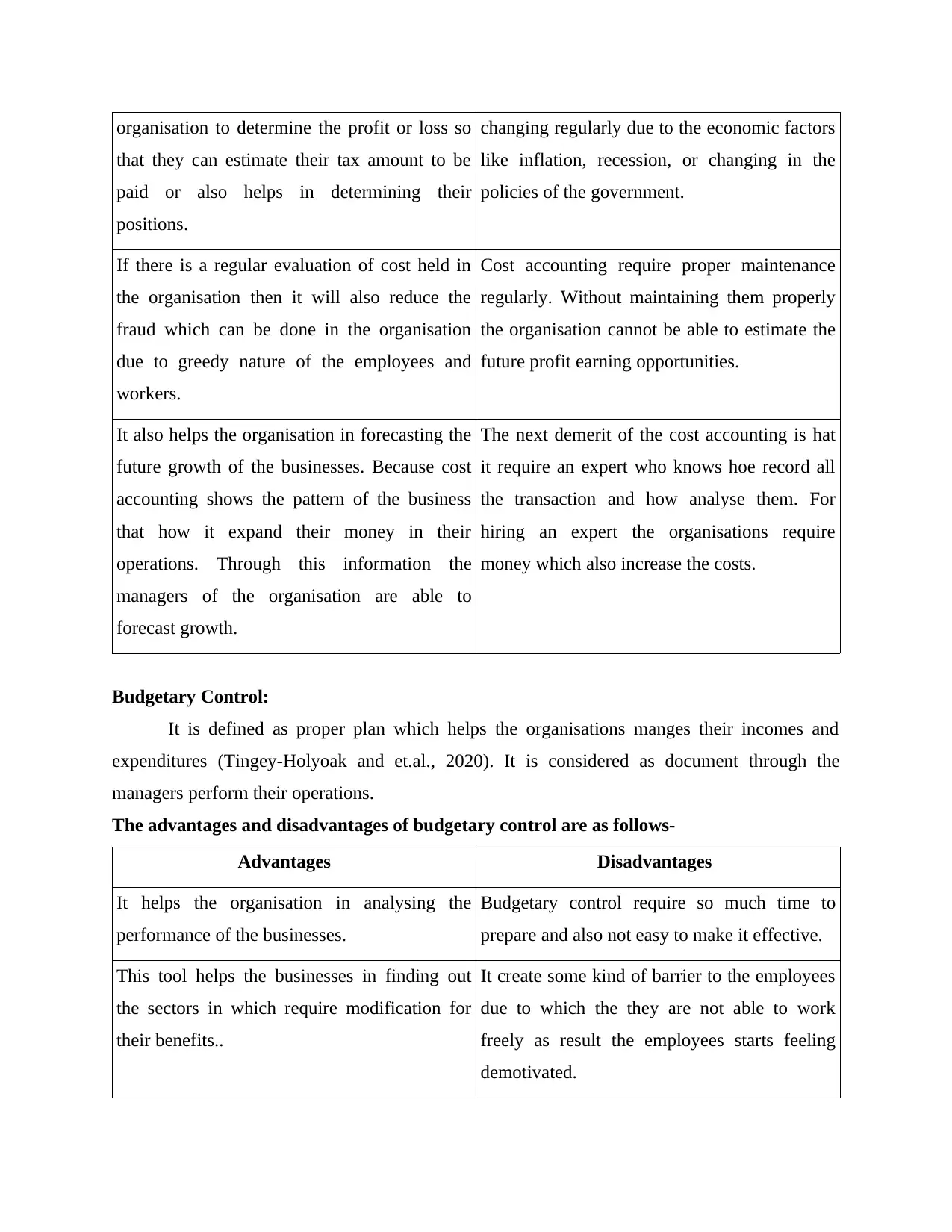
organisation to determine the profit or loss so
that they can estimate their tax amount to be
paid or also helps in determining their
positions.
changing regularly due to the economic factors
like inflation, recession, or changing in the
policies of the government.
If there is a regular evaluation of cost held in
the organisation then it will also reduce the
fraud which can be done in the organisation
due to greedy nature of the employees and
workers.
Cost accounting require proper maintenance
regularly. Without maintaining them properly
the organisation cannot be able to estimate the
future profit earning opportunities.
It also helps the organisation in forecasting the
future growth of the businesses. Because cost
accounting shows the pattern of the business
that how it expand their money in their
operations. Through this information the
managers of the organisation are able to
forecast growth.
The next demerit of the cost accounting is hat
it require an expert who knows hoe record all
the transaction and how analyse them. For
hiring an expert the organisations require
money which also increase the costs.
Budgetary Control:
It is defined as proper plan which helps the organisations manges their incomes and
expenditures (Tingey-Holyoak and et.al., 2020). It is considered as document through the
managers perform their operations.
The advantages and disadvantages of budgetary control are as follows-
Advantages Disadvantages
It helps the organisation in analysing the
performance of the businesses.
Budgetary control require so much time to
prepare and also not easy to make it effective.
This tool helps the businesses in finding out
the sectors in which require modification for
their benefits..
It create some kind of barrier to the employees
due to which the they are not able to work
freely as result the employees starts feeling
demotivated.
that they can estimate their tax amount to be
paid or also helps in determining their
positions.
changing regularly due to the economic factors
like inflation, recession, or changing in the
policies of the government.
If there is a regular evaluation of cost held in
the organisation then it will also reduce the
fraud which can be done in the organisation
due to greedy nature of the employees and
workers.
Cost accounting require proper maintenance
regularly. Without maintaining them properly
the organisation cannot be able to estimate the
future profit earning opportunities.
It also helps the organisation in forecasting the
future growth of the businesses. Because cost
accounting shows the pattern of the business
that how it expand their money in their
operations. Through this information the
managers of the organisation are able to
forecast growth.
The next demerit of the cost accounting is hat
it require an expert who knows hoe record all
the transaction and how analyse them. For
hiring an expert the organisations require
money which also increase the costs.
Budgetary Control:
It is defined as proper plan which helps the organisations manges their incomes and
expenditures (Tingey-Holyoak and et.al., 2020). It is considered as document through the
managers perform their operations.
The advantages and disadvantages of budgetary control are as follows-
Advantages Disadvantages
It helps the organisation in analysing the
performance of the businesses.
Budgetary control require so much time to
prepare and also not easy to make it effective.
This tool helps the businesses in finding out
the sectors in which require modification for
their benefits..
It create some kind of barrier to the employees
due to which the they are not able to work
freely as result the employees starts feeling
demotivated.
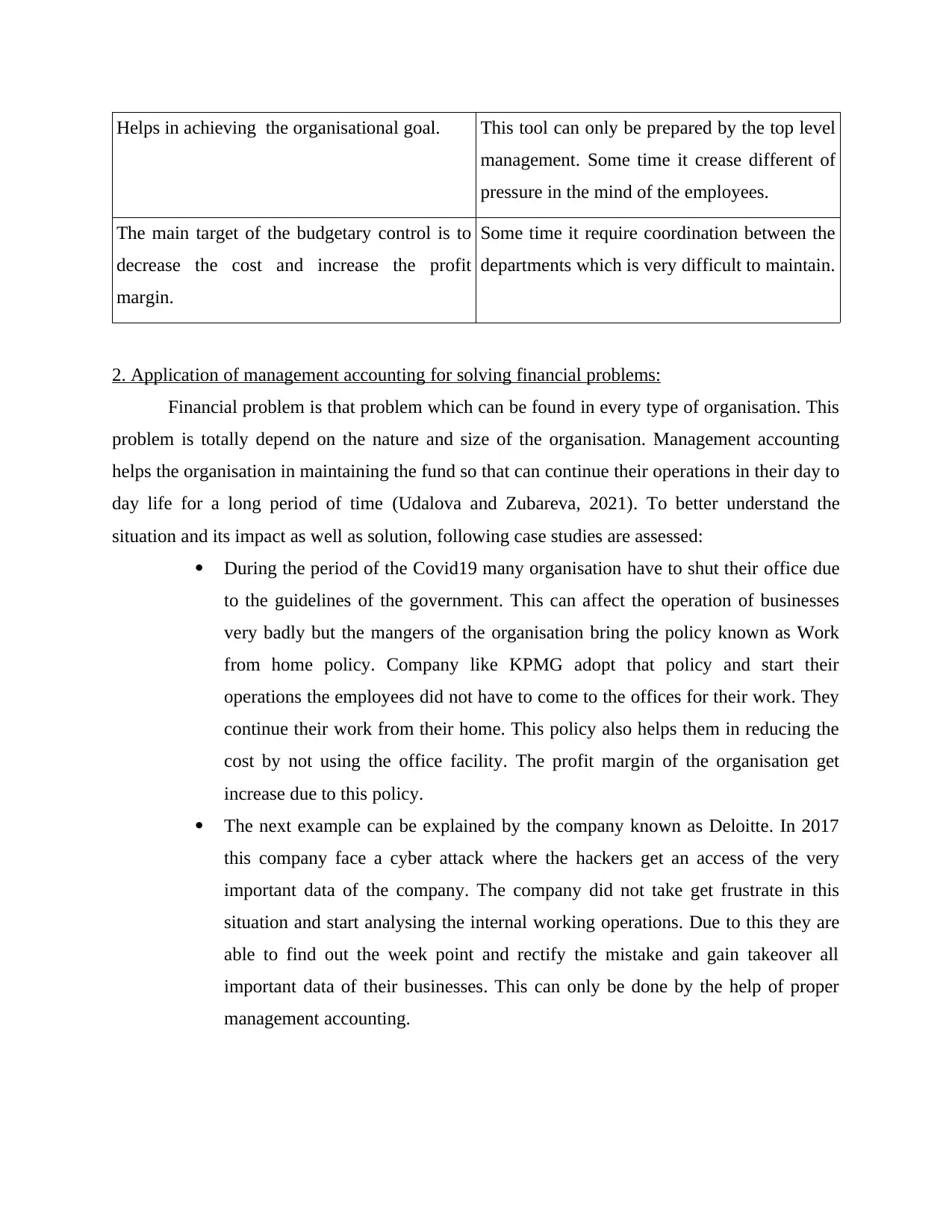
Helps in achieving the organisational goal. This tool can only be prepared by the top level
management. Some time it crease different of
pressure in the mind of the employees.
The main target of the budgetary control is to
decrease the cost and increase the profit
margin.
Some time it require coordination between the
departments which is very difficult to maintain.
2. Application of management accounting for solving financial problems:
Financial problem is that problem which can be found in every type of organisation. This
problem is totally depend on the nature and size of the organisation. Management accounting
helps the organisation in maintaining the fund so that can continue their operations in their day to
day life for a long period of time (Udalova and Zubareva, 2021). To better understand the
situation and its impact as well as solution, following case studies are assessed:
During the period of the Covid19 many organisation have to shut their office due
to the guidelines of the government. This can affect the operation of businesses
very badly but the mangers of the organisation bring the policy known as Work
from home policy. Company like KPMG adopt that policy and start their
operations the employees did not have to come to the offices for their work. They
continue their work from their home. This policy also helps them in reducing the
cost by not using the office facility. The profit margin of the organisation get
increase due to this policy.
The next example can be explained by the company known as Deloitte. In 2017
this company face a cyber attack where the hackers get an access of the very
important data of the company. The company did not take get frustrate in this
situation and start analysing the internal working operations. Due to this they are
able to find out the week point and rectify the mistake and gain takeover all
important data of their businesses. This can only be done by the help of proper
management accounting.
management. Some time it crease different of
pressure in the mind of the employees.
The main target of the budgetary control is to
decrease the cost and increase the profit
margin.
Some time it require coordination between the
departments which is very difficult to maintain.
2. Application of management accounting for solving financial problems:
Financial problem is that problem which can be found in every type of organisation. This
problem is totally depend on the nature and size of the organisation. Management accounting
helps the organisation in maintaining the fund so that can continue their operations in their day to
day life for a long period of time (Udalova and Zubareva, 2021). To better understand the
situation and its impact as well as solution, following case studies are assessed:
During the period of the Covid19 many organisation have to shut their office due
to the guidelines of the government. This can affect the operation of businesses
very badly but the mangers of the organisation bring the policy known as Work
from home policy. Company like KPMG adopt that policy and start their
operations the employees did not have to come to the offices for their work. They
continue their work from their home. This policy also helps them in reducing the
cost by not using the office facility. The profit margin of the organisation get
increase due to this policy.
The next example can be explained by the company known as Deloitte. In 2017
this company face a cyber attack where the hackers get an access of the very
important data of the company. The company did not take get frustrate in this
situation and start analysing the internal working operations. Due to this they are
able to find out the week point and rectify the mistake and gain takeover all
important data of their businesses. This can only be done by the help of proper
management accounting.
⊘ This is a preview!⊘
Do you want full access?
Subscribe today to unlock all pages.

Trusted by 1+ million students worldwide
1 out of 15
Related Documents
Your All-in-One AI-Powered Toolkit for Academic Success.
+13062052269
info@desklib.com
Available 24*7 on WhatsApp / Email
![[object Object]](/_next/static/media/star-bottom.7253800d.svg)
Unlock your academic potential
Copyright © 2020–2026 A2Z Services. All Rights Reserved. Developed and managed by ZUCOL.



